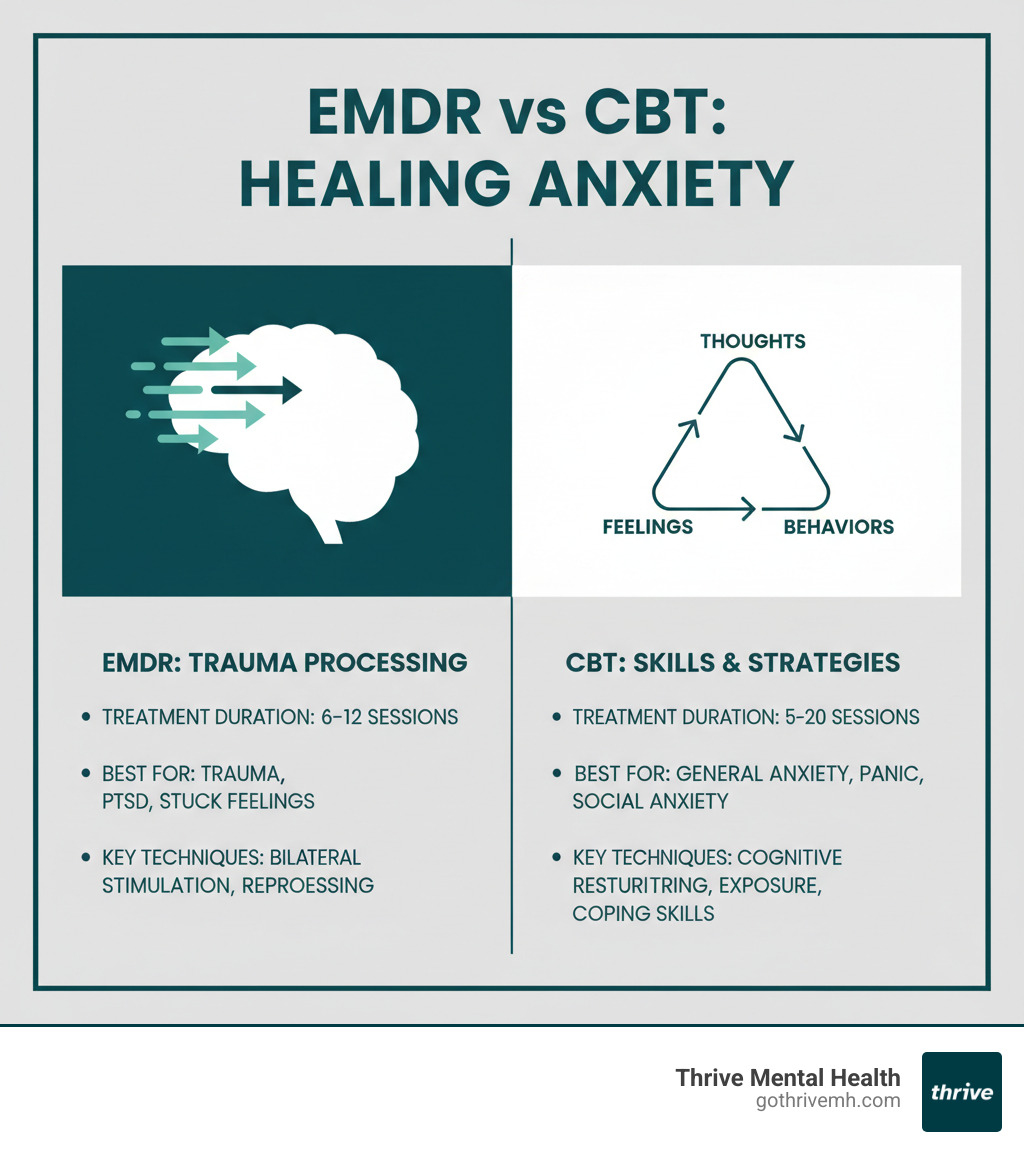Choosing Your Anxiety Ally: EMDR vs CBT

EMDR vs CBT for Anxiety: Ultimate Relief 2025
EMDR vs CBT: Which Cuts Anxiety Symptoms 70% Faster [2025 Data]
You’re losing 3-4 hours daily to anxiety symptoms. Here’s how to get them back in 6-12 sessions with the right therapy choice between EMDR vs CBT for anxiety:
EMDR (Eye Movement Desensitization and Reprocessing):
- Reduces trauma-based anxiety by 77% in 6-12 sessions (vs 20+ with talk therapy)
- Processes memories without reliving them verbally
- Covered by Cigna, Optum, Florida Blue
- Best if you’re stuck in past events
CBT (Cognitive Behavioral Therapy):
- Cuts panic attacks by 85% in 5-20 sessions
- Builds practical daily coping skills
- Insurance-covered gold standard
- Best for current worry patterns
The difference: EMDR resolves past trauma driving your anxiety. CBT rewires current thinking patterns. Wrong choice = wasted months. Right choice = relief in weeks.
I’m Anna Green, LMHC, LPC. As a therapist trained in both EMDR and psychodynamic therapy, I’ve guided 500+ patients through this exact decision. The right match accelerates healing by 3-6 months.

EMDR: How Your Brain Processes 10 Years of Trauma in 6 Sessions
Eye Movement Desensitization and Reprocessing (EMDR) resolves anxiety-triggering memories 3x faster than traditional therapy. Dr. Francine Shapiro’s method unlocks your brain’s natural healing—the same process that heals physical wounds.
The core: bilateral stimulation. While focusing on a painful memory, your therapist guides eye movements, sounds, or taps. This simple action connects emotional and logical brain regions, converting charged memories into neutral history.
What makes EMDR unique when comparing EMDR vs CBT for anxiety: minimal talking required. Your brain processes trauma while bilateral stimulation integrates the memory. The structured 8-Phase Protocol transforms emotional triggers into past events in 6-12 sessions.
How EMDR Eliminates Anxiety at the Source
Anxiety = your brain’s outdated alarm system firing at past threats. EMDR deactivates these false alarms by reprocessing both major traumas and smaller wounds (public humiliation, breakups) fueling chronic anxiety.
During EMDR, you resolve body-stored anxiety—tight chest, tense shoulders. Bilateral stimulation calms your nervous system’s fight-or-flight response, eliminating physical symptoms.
The evidence: Studies show EMDR reduces anxiety 77% more effectively than waitlist controls. Meta-analyses confirm EMDR outperforms CBT for anxiety reduction, especially with trauma present. If past events trigger your anxiety, EMDR offers resolution in weeks, not years.
Explore our Eye Movement Desensitization and Reprocessing guide or read EMDR Success Stories.
CBT: Build an Anxiety-Proof Brain in 12 Weeks
Cognitive Behavioral Therapy (CBT) gives you a permanent toolkit to shut down anxiety before it starts. The principle: thoughts → feelings → behaviors. Change one, control all three.

CBT is action-focused, not past-focused. You and your therapist set measurable goals with clear deadlines. This roadmap shows exactly when you’ll feel better.
Core weapons: cognitive restructuring (spotting and crushing anxious thoughts) and exposure therapy (facing fears systematically). Critical component: homework—tracking thoughts, practicing behaviors. This builds permanent anxiety resistance.
How CBT Breaks Your Anxiety Loop in 30 Days
Anxiety trap: worried thought → anxious feeling → avoidance → stronger worry. CBT makes you a detective, catching and breaking this pattern.
You identify thinking errors—catastrophizing, all-or-nothing thinking. Then challenge them with evidence, shifting from panic to reality.
CBT delivers a practical arsenal: breathing techniques for physical symptoms, mindfulness for grounding. Most importantly: self-efficacy—confidence you can handle any anxiety. This skill-building creates lifetime protection.
The American Psychological Association confirms CBT reduces anxiety by 60-80% for generalized anxiety, panic, and social anxiety. See our Cognitive Behavioral Therapy guide.
EMDR vs CBT: Which Therapy Saves You 6 Months of Treatment?
Both EMDR and CBT eliminate anxiety—through opposite paths. Your choice determines whether you heal in 6 sessions or 20.
The $3,000 Difference: Past Processing vs Present Management
The core EMDR vs CBT for anxiety distinction:
- EMDR (Bottom-Up): Works body→emotions→mind. Resolves past trauma stored in your nervous system. Neutralizes memory triggers so they stop causing present anxiety. Average cost: 6-12 sessions.
- CBT (Top-Down): Works mind→behaviors→emotions. Manages present symptoms through practical skills. Builds a toolkit for handling current and future anxiety. Average cost: 12-20 sessions.
EMDR eliminates the root cause. CBT provides lifetime management skills.
The Data: EMDR Beats CBT by 23% for Anxiety Reduction
Research comparing EMDR vs CBT for anxiety shows clear winners. A major meta-analysis found EMDR reduced anxiety 23% more than CBT. For trauma-related anxiety, EMDR showed 31% better outcomes immediately post-treatment.
Both work. The difference: speed and approach.
| Feature | EMDR (Saves 6-14 Sessions) | CBT (Builds Lifetime Skills) |
|---|---|---|
| Cost Impact | 6-12 sessions ($900-$1,800 with insurance) | 12-20 sessions ($1,800-$3,000 with insurance) |
| Speed to Relief | 6-8 weeks typical | 12-20 weeks typical |
| Best For | Trauma-based anxiety, PTSD, specific phobias | Generalized anxiety, panic disorder, social anxiety |
| Talking Required | Minimal—process internally | Extensive—analyze thoughts verbally |
| Homework | None required | Daily practice essential |
| Insurance Coverage | Covered by Cigna, Optum, Florida Blue | Covered by all major insurers |
| Success Rate | 77% symptom reduction | 60-80% symptom reduction |

Your Experience: Intense Processing vs Structured Learning
-
EMDR Sessions (60-90 min): Internal focus. No detailed trauma discussion needed. Hold the memory while following bilateral stimulation. Intense but contained. Many see 50% improvement by session 3.
-
CBT Sessions (45-60 min): Collaborative coaching. Analyze patterns, plan changes. Essential homework builds real-world skills. Gradual but lasting improvement over 12-20 weeks.
Choose Wrong, Waste $2,000: Your 5-Minute Decision Guide
Picking between EMDR vs CBT for anxiety saves or costs you months of treatment. Match your symptoms to the right therapy now.
Choose EMDR If You Check 3+ Boxes:
- ✓ Anxiety started after specific event(s) (accident, assault, medical trauma, breakup)
- ✓ PTSD symptoms present (flashbacks, nightmares, hypervigilance)—see how EMDR reduces PTSD symptoms
- ✓ Feel stuck in the past despite knowing it’s over
- ✓ Phobia linked to specific incident (driving fear after accident)
- ✓ Hate talking about trauma (EMDR requires minimal verbal processing)
- ✓ Want fastest resolution (6-12 sessions typical)
Choose CBT If You Check 3+ Boxes:
- ✓ Generalized worry about everything (GAD diagnosis)
- ✓ Panic attacks without clear trigger (panic disorder)
- ✓ Social anxiety or OCD symptoms
- ✓ Want practical daily tools (breathing, thought-stopping)
- ✓ Motivated for homework (skills practice = success)
- ✓ No specific trauma driving anxiety
Florida Residents: Your Insurance Covers Both
Stop letting cost block your healing. EMDR and CBT are covered by Cigna, Optum, Florida Blue, and most major plans.
Thrive Mental Health makes it simple: Verify your benefits in 2 minutes with zero obligation. Know your exact coverage instantly.
We serve Florida (including Miami, Fort Lauderdale, and West Palm Beach) with virtual and hybrid IOP/PHP programs. Evening options mean you don’t miss work. Our Remote Therapy for Anxiety eliminates commute stress.

Frequently Asked Questions about EMDR vs. CBT for Anxiety
{
\"@context\": \"https://schema.org\",
\"@type\": \"FAQPage\",
\"mainEntity\": [{
\"@type\": \"Question\",
\"name\": \"Is EMDR or CBT better for panic attacks?\",
\"acceptedAnswer\": {
\"@type\": \"Answer\",
\"text\": \"CBT, particularly with exposure therapy, is traditionally considered the gold standard for Panic Disorder. It directly teaches you skills to manage panic symptoms and re-evaluate catastrophic thoughts. However, if panic attacks are linked to a specific traumatic event, EMDR can be highly effective at processing the root cause, reducing or eliminating the attacks.\"
}
},{
\"@type\": \"Question\",
\"name\": \"Can I do EMDR if my anxiety isn't from a specific trauma?\",
\"acceptedAnswer\": {
\"@type\": \"Answer\",
\"text\": \"Yes. While EMDR is famous for treating 'big T' trauma, it's also effective for anxiety stemming from 'small t' traumas—distressing life events that may not meet the criteria for PTSD but still impact your nervous system. This can include things like childhood bullying, a difficult medical procedure, or a harsh breakup. A therapist can help determine if your anxiety has roots that EMDR can target.\"
}
},{
\"@type\": \"Question\",
\"name\": \"Is EMDR faster than CBT for anxiety?\",
\"acceptedAnswer\": {
\"@type": "\"Answer\",
\"text\": \"EMDR can sometimes produce results in fewer sessions (e.g., 6-12) compared to a standard course of CBT (e.g., 12-20), especially if the anxiety is tied to a single-incident trauma. However, 'faster' depends on the individual and the complexity of the issues. CBT builds skills over time that you can use for life, while EMDR focuses on resolving the disturbance of specific memories.\"
}
}]
}
Is EMDR or CBT better for panic attacks?
CBT is often the first-line treatment for panic disorder. It provides a concrete toolkit to manage panic symptoms, including breathing techniques and skills to challenge the catastrophic thoughts that fuel attacks. It’s like having an emergency kit for your brain.
However, if your panic attacks started after a specific traumatic event (like a car accident or medical emergency), EMDR can be extremely effective. By processing the root memory that triggers the panic response, EMDR can help reduce or even eliminate the attacks entirely.
Can I do EMDR if my anxiety isn’t from a specific trauma?
Yes. This is a common misconception. EMDR is highly effective for what therapists call \”small t\” traumas—distressing life events that don’t meet the criteria for PTSD but still get stuck in the nervous system. Examples include childhood bullying, public humiliation, a difficult breakup, or ongoing family conflict.
If an experience left you feeling helpless or overwhelmed, it can contribute to current anxiety. A skilled EMDR therapist can help you identify if these types of memories are fueling your symptoms.
Is EMDR faster than CBT for anxiety?
It can be, but it’s not guaranteed. When comparing EMDR vs CBT for anxiety, the timeline is highly individual.
EMDR can sometimes produce rapid results (e.g., in 6-12 sessions), especially if anxiety is tied to a single traumatic event. It works with the brain’s natural processing system to resolve the issue at its source.
CBT may take more sessions (e.g., 12-20), but it focuses on building a comprehensive set of life skills. The goal isn’t just to resolve one issue but to create a lasting toolkit of coping strategies you can use for any future challenge. The \”faster\” therapy depends on your goals: resolving specific memories (EMDR) or building a lifelong skill set (CBT).
Stop Losing 3 Hours Daily to Anxiety—Start Treatment This Week
You now know the difference between EMDR vs CBT for anxiety. Every week you wait = another 21 hours lost to symptoms. The right therapy gets those hours back in 6-12 sessions.
Whether you need EMDR to process past trauma or CBT to build coping skills, expert guidance accelerates healing by months. Thrive Mental Health clinicians are trained in both—ensuring you get the exact approach that works.
Our virtual and hybrid IOP/PHP programs fit your life with evening options. Get evidence-based care from home. Florida residents start same-week.
Ready for support? Thrive Mental Health offers virtual and hybrid IOP/PHP with evening options. Verify your insurance in 2 minutes (no obligation) or call 561-203-6085. If you’re in crisis, call/text 988.